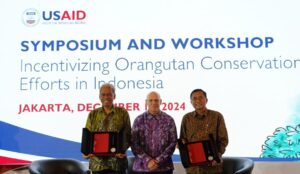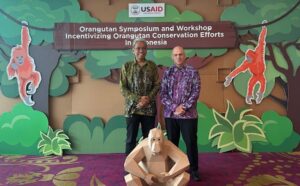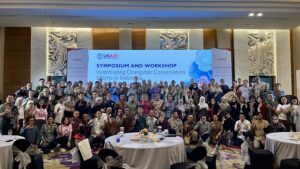
Today, the United States Agency for International Development (USAID) and the Indonesian Ministry of Forestry convened “The Orangutan Symposium: Incentivizing Orangutan Conservation Efforts in Indonesia” in Jakarta to strengthen collaborative efforts to protect orangutan’s species and their habitats. The event brought together stakeholders from the public and private sectors, academia, and organizations working in biodiversity conservation to advance orangutan conservation strategies.
“The United States is committed to protecting Indonesia’s iconic orangutan species through strong partnerships,” said Jeff Cohen, USAID Indonesia Mission Director. “We are encouraging private sector partners, civil society, and non-governmental organizations to work hand in hand with the Government of Indonesia in safeguarding orangutan populations and their habitats.”
The symposium is a key step in USAID’s commitment to support the Indonesian government’s 2030 FOLU Net Sink Operational Plan, which includes conservation of orangutans. Since 2001, the United States has invested over $50 million through USAID to protect Indonesia’s orangutans and their habitats, as part of a broader commitment to natural resources management. U.S. partnerships with the government, private sector, and civil society to conserve and protect Indonesia’s rich tropical forests are helping to protect 6.5 million hectares of orangutan habitat.
Indonesia is home to the world’s most diverse primate population, containing 70 percent of endangered primate species. Three of these are orangutan species native to Indonesia: Pongo abelii (Sumatran orangutan), Pongo tapanuliensis (Tapanuli orangutan), and Pongo pygmaeus (Bornean orangutan) estimated about 70,000 remaining population.

Indonesia is one of the world’s most biodiverse countries, home to a wide range of habitats, ecosystems, and endemic species found nowhere else in the world. This rich biodiversity faces increasing threats from unsustainable practices and the illegal wildlife trade.
“A collaborative approach is fundamental in protecting Indonesia’s rich biodiversity, which will also contribute to reducing wildlife trafficking,” said Prof. Dr. Satyawan Pudyatmoko, Director General of Natural Resource and Ecosystem Conservation at the Ministry of Forestry. “We hope that through this symposium, we can identify innovative incentives to leverage and implement concrete strategies to protect orangutans and other protected species.”
Successful Orangutan conservation in Indonesia requires active collaboration among private businesses, local governments, and communities – especially those located near forest areas.
Prof. Jatna Supriatna, Professor of Biology at the Faculty of Mathematics and Natural Sciences at the Universitas Indonesia, and a renowned wildlife expert and conservation biologist, emphasized the importance of grassroots collaboration to protect orangutan habitats through ecotourism development as an example of an innovative incentive. “Sustainable tourism development by communities near forest areas will not only contribute to orangutan habitat protection but also provide added social and economic value for communities,” said Prof. Jatna Suprianta.
Through USAID, the United States continues to partner with Indonesia in orangutan conservation. USAID currently supports multiple conservation initiatives, including orangutan corridor management, population and habitat surveys, habitat preservation and restoration, and private sector investment mobilization.

